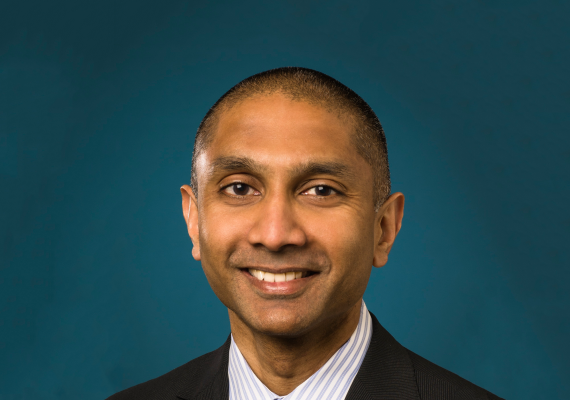
Dr. Wijeysundera is an interventional cardiologist in the Schulich Heart Centre of Sunnybrook Health Sciences Centre and an assistant professor and clinician-scientist at the University of Toronto. He is a Principal Investigator for the PACE study, part of the MaRS EXCITE program, coordinated through the Applied Health Research Centre at the HUB of St Michael’s Hospital.
The following interview has been edited for clarity and brevity by Sarah Grant Alvarado.
What is your area of research?
I’m part of the cardiovascular group at ICES that does health services research using administrative data. My primary focus in the larger area of health services research is health technology assessments and my graduate work was on developing methods for doing health technology assessment using administrative data. My research is divided between more traditional health services research as it applies to cardiology but also on how to use administrative data for understanding longitudinal health care costs.
Why did you decide to go into that area of research for your career?
Early in my research career, while I was doing my graduate work, I realized that there were a large number of cardiology health services researchers in the research community, but few of them were working in the specific area of looking at healthcare costs and economic models. Health services by definition looks at care on a macro level, in contrast to basic science or even more pure clinical research. I like the big picture approach to care.
Which study do you think has caused the greatest impact in your career?
I am not sure how one measures impact necessarily, and I am the early part of my career so it’s probably not that easy to know the impact of my studies. I’ll probably only know that towards the middle or end of my career once I’ve had an opportunity to see longer term results. I have worked on a number of projects that seemed to have garnered interest from both my peers and also from health policy groups. One of the first studies I worked on was really a very simple meta-analysis of previous studies that looked at therapies for patients who had failed the traditional ways of treating heart attacks. Somewhat surprisingly, that garnered a lot of attention that actually went into the updated American guidelines for heart attack care which probably was one of the reasons I continued on the research path. Typically, success makes you want to continue that way.
How would you define successful research?
As researchers we typically work within larger institutions, and as a result have external benchmarks by our institutions that tell us whether we are ‘successful’. Do we have adequate research fund to run our program? Have we published the adequate number of papers? I would be lying to say those things weren’t important to me. I think all researchers get external validation from those things and they are benchmarks that we need to meet otherwise we’re not allowed to do research.
For me, success isn’t necessarily defined by those factors alone. If I’m working on a project or idea that made me excited and find something that I was either expecting or not anticipating – those moments of working out a new method of doing something or finding a result that I didn’t expect and putting together a product that shows that process – those are certainly the most enjoyable parts of research for me. In an ideal world I wish that was enough for me to be successful in research. That I would get paid and get an office and staff to just do things that I found really interesting. If the only thing that is important to a researcher is to produce papers, obtain grants and do work that you don’t find all that interesting, I think that’s a bit of a shame.
Success to me is to find that balance where you are actually able to do work that makes you want to come in to work every day. I have been fortunate to find that balance early in my career. Do those projects always translate to papers that get published in places that I would like them to get published? No! I wish people would find the work that I find really fascinating just as fascinating. The internal validation of success to me is to continue to find that enthusiasm for the work I do and not get bogged down by some of the logistics of the research enterprise of meeting these external benchmarks.
Can you reflect on what you feel has contributed to your success so far as a researcher?
I think all clinician scientists are always a bit torn because we have two loves. I truly love my clinical work I enjoy seeing patients, I like being in the cath lab – I enjoy that component of my career tremendously. I also happen to really enjoy the science component of it. I think I have been fortunate, extremely fortunate, to work in a group that values both of those components and values my contributions to our groups. I am not sure I have had an “Aha!” moment that said I want to pursue this path but I am extremely fortunate that I worked in a group that has not required me to choose only one aspect of my career because I would have an awfully hard time doing that. I don’t feel that I need to sacrifice one for the other, so the success I guess that I’ve had so far in this early part of my career has been because I am in an environment that has really facilitated that.
